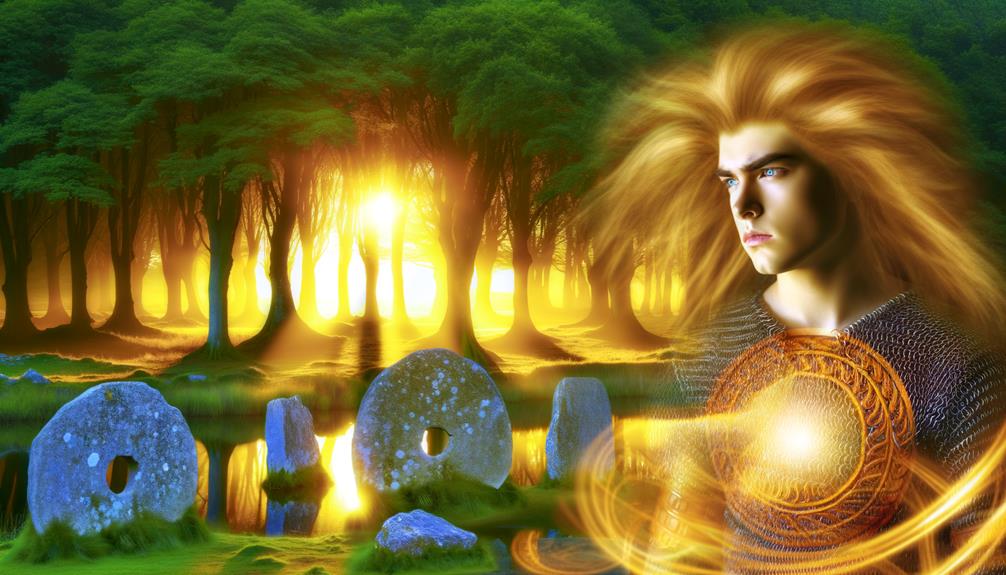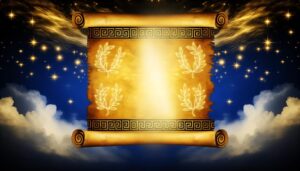Meaning of the Name Cian
The name Cian, originating from the Old Irish term 'cían' meaning 'long' or 'enduring,' carries profound significance in Irish mythology and Gaelic traditions. It is historically linked to Celtic nobility and is the father of the mythical hero Lugh.
Pronounced 'KEE-an' in Ireland and variably as 'SEE-an' or 'SY-an' in Anglophone regions, Cian symbolizes resilience and timelessness. The name has seen a resurgence in modern times, being favored for its authentic Irish roots.
Prominent individuals named Cian, such as journalist Cian McCormack and athlete Cian Healy, underscore its contemporary relevance. Explore further for deeper insights into its rich cultural heritage.

Key Takeaways
- The name Cian originates from ancient Irish mythology and the Gaelic language.
- Cian means 'long' or 'enduring,' derived from the Old Irish word 'cíán.'
- It is historically significant, symbolizing lineage, heroism, and nobility in Celtic traditions.
- The name is linked to the legendary hero Lugh, highlighting its mythological importance.
- Cian is increasingly popular in modern times, valued for its traditional yet unique appeal.
Origins of the Name
The name Cian originates from ancient Irish mythology and Gaelic language, where it holds significant historical and cultural importance. Derived from the Old Irish word 'cían,' meaning 'long' or 'enduring,' the name is deeply rooted in Celtic traditions.
In mythology, Cian is notably recognized as the father of Lugh, a prominent deity associated with skill and craftsmanship, reinforcing the name's venerable status within Irish lore. The etymological origins underscore qualities of longevity and resilience, reflecting the enduring legacy of the name in Irish culture.
Historical texts and genealogical records frequently reference the name, indicating its widespread use and esteemed position. This way, Cian encapsulates both mythological grandeur and linguistic heritage, making it a name of profound cultural resonance.
Pronunciation Variations
While the name Cian holds a profound cultural resonance rooted in ancient Irish mythology, its pronunciation varies noticeably across different regions and linguistic traditions.
In its native Irish context, Cian is typically pronounced as 'KEE-an,' reflecting the phonetic idiosyncrasies of the Gaelic language.
However, in Anglophone regions, particularly in the United States and the United Kingdom, the pronunciation often shifts to 'SEE-an' or 'SY-an,' influenced by English phonological patterns. These variations can lead to discrepancies in the name's perceived authenticity and cultural fidelity.
Additionally, the name's adaptation into other languages, where phonetic rules differ substantially from both Irish and English, further diversifies its pronunciation, thereby contributing to a rich tapestry of linguistic interpretations.
Historical Significance
Rooted in ancient Irish mythology, the name Cian carries significant historical weight, symbolizing both lineage and heroism in Celtic narratives. Historically, the name Cian has been associated with notable figures in Irish history, suggesting an enduring legacy of leadership and valor.
One prominent bearer of the name was Cian mac Mael Muad, a notable 10th-century Irish king whose influence extended across Munster. Such historical associations underscore the name's importance in the socio-political landscape of medieval Ireland.
Additionally, the name Cian has appeared in various annals and genealogies, highlighting its prevalence among the Gaelic nobility. This historical context enriches the name's contemporary significance, providing a deep-rooted connection to Ireland's storied past.
Mythological Connections
The name Cian holds substantial mythological importance within Irish tradition. It is linked to ancient mythical origins. In Irish mythology, Cian is prominently recognized as the father of the legendary hero Lugh, a prominent figure among the Tuatha Dé Danann. This connection underscores Cian's deep-rooted presence in the pantheon of legendary Irish heroes, highlighting the cultural and narrative weight the name carries.
Irish Mythical Origins
Cian, a name steeped in Irish mythology, is closely associated with the ancient mythological figure Cian mac Cainte, father of the legendary hero Lugh. This connection situates the name within the rich tapestry of Irish myth, underscoring its significance in the cultural and mythological heritage of Ireland.
Cian mac Cainte is often depicted as a pivotal figure within the Tuatha Dé Danann, a supernatural race in Irish lore. The name 'Cian' itself is thought to derive from the Old Irish word 'cían,' meaning 'long' or 'enduring,' emphasizing qualities of longevity and resilience.
As a result, the mythological implications of the name Cian reflect not only the storied past of Irish myth but also the enduring qualities it signifies.
Legendary Heroes Named Cian
Exploring the mythological landscape of Ireland reveals several legendary heroes named Cian, whose stories collectively reinforce the name's association with enduring virtues and heroic legacy.
One prominent figure is Cian mac Cáinte, a member of the Tuatha Dé Danann, renowned for his wisdom and bravery.
Another notable hero is Cian, the father of the legendary Lugh, who played a pivotal role in the Second Battle of Mag Tuired.
These narratives not only highlight the valor and strategic acumen attributed to individuals named Cian but also emphasize their integral roles within mythological lore.
Through these tales, the name Cian emerges as a symbol of strength, intelligence, and unwavering commitment to one's people, thereby enriching its cultural and historical significance.
Modern Popularity
In recent years, the name Cian has seen a notable increase in popularity, particularly in English-speaking countries. This rise can be attributed to a renewed interest in authentic Irish names and their cultural significance. According to various name databases, Cian has made its way into the top baby name lists in several regions.
Below is a table that highlights the popularity rankings of the name Cian in three distinct countries over recent years:
| Country | 2020 Rank | 2022 Rank |
|---|---|---|
| Ireland | 24 | 18 |
| United States | 512 | 490 |
| Australia | 135 | 120 |
This data illustrates a consistent upward trend, suggesting an increasing appreciation for traditional yet unique names like Cian.
Cultural Impact
The name Cian holds substantial historical significance in Ireland, often associated with figures in ancient mythology and early Irish kingship. Its enduring presence has not only preserved its traditional roots but has also influenced contemporary naming practices.
This cultural legacy underscores the name's continued relevance and adaptability in modern contexts.
Historical Significance in Ireland
Cian, a name steeped in Irish mythological tradition, holds significant cultural impact, as it is frequently associated with historical figures and legendary tales from ancient Ireland. Its usage is particularly notable in three key areas:
- Mythological Lineage: Cian, the father of the god Lugh, features prominently in the mythological cycle, underscoring his importance in pre-Christian Irish lore.
- Historical Figures: Historical texts reference several notable individuals named Cian, including Cian mac Máelmuaid, a figure in the Battle of Clontarf.
- Cultural Narratives: The name appears in numerous early Irish sagas and tales, solidifying its standing in the cultural fabric of Ireland.
These aspects collectively highlight the enduring significance of Cian within Irish historical and cultural contexts.
Influence on Modern Names
Frequently observed in contemporary naming conventions, the name Cian continues to exert a notable influence on modern Irish and global naming trends, reflecting its deep-rooted cultural heritage.
The resurgence of traditional Irish names, including Cian, signifies a broader movement towards cultural preservation and identity reinforcement. This trend is not confined to Ireland; the name Cian has been embraced globally, often chosen for its historical resonance and phonetic simplicity.
Its integration into popular culture and media further solidifies its appeal, making it a preferred choice among parents seeking a name that embodies both heritage and modernity.
Scholarly analysis suggests that the name's continued popularity underscores a collective desire to maintain cultural continuity in an increasingly globalized world.
Famous Bearers
Renowned for its historical and cultural significance, the name Cian has been borne by several notable figures across various domains. This name, deeply rooted in Irish heritage, has been associated with leaders, artists, and athletes, underscoring its broad appeal and timelessness.
- Cian McCormack – A distinguished journalist with RTÉ, Ireland's national broadcaster, contributing to significant news coverage and investigative reporting.
- Cian Healy – A prominent rugby player for Leinster and the Irish national team, celebrated for his athletic prowess and contribution to the sport.
- Cian O'Connor – An accomplished equestrian who represented Ireland in international competitions, earning accolades for his skill and dedication.
These individuals exemplify the versatility and enduring popularity of the name Cian in contemporary society.
Symbolic Meanings
Building on its notable bearers, the name Cian also holds profound symbolic meanings rooted in ancient Irish mythology and linguistic traditions.
Derived from the Old Irish word 'cían,' meaning 'ancient' or 'enduring,' the name encapsulates a sense of timelessness and resilience.
In mythology, Cian is often associated with wisdom, as exemplified by the legendary figure Cian mac Cáinte, who fathered the god Lugh, a deity symbolizing skill and mastery.
This connotation of wisdom and heritage is further enriched by the name's phonetic similarity to 'cian,' a poetic term denoting distant times.
Therefore, the name Cian embodies a dual essence of historical depth and intellectual prowess, making it a name of considerable symbolic weight.
Conclusion
In conclusion, the name Cian, with its deep-seated origins and diverse tapestry of historical, mythological, and cultural importance, serves as a guiding light of ancient valor and contemporary relevance.
Its pronunciation differences and symbolic significances interlace a intricate story that surpasses time.
The name's lasting popularity and existence among noteworthy individuals highlight its timeless attraction.
Therefore, Cian stands as a confirmation of the enduring influence of names in molding identity and heritage, much like an unerasable imprint on the sands of time.






